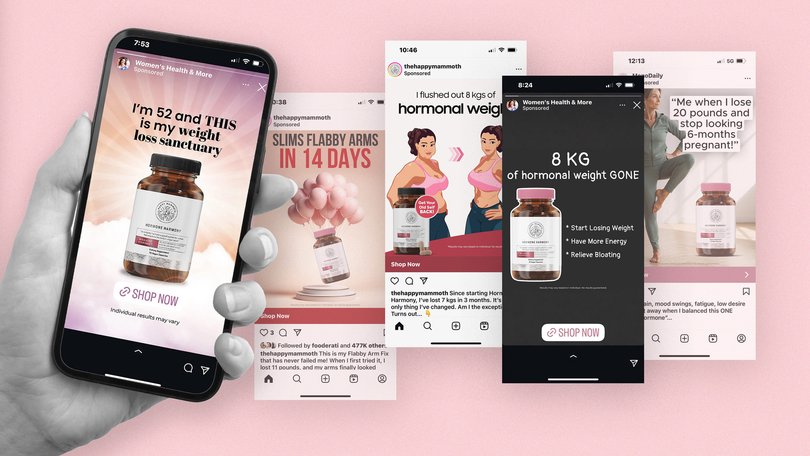Expert: Happy Mammoth’s ‘emotionally manipulative’ weight loss ads could exacerbate eating disorders
A marketing expert has lashed out at an Australian business bombarding women on social media with weight loss ads as using ‘emotionally manipulative’ methods that could exacerbate eating disorders.

A marketing expert has lashed out at an Australian business bombarding women on social media with weight loss ads as using “emotionally manipulative” methods that could exacerbate eating disorders.
Happy Mammoth – which claims to be a “9-figure women’s health brand” – targets perimenopausal and menopausal women with the promise of “effortless” rapid weight loss and dramatic physical transformation without needing to change their lifestyle, diet or activity level.
A recent social media ad said Happy Mammoth’s flagship product Hormone Harmony – a mix of vitamins and herbs in a capsule – will “Melt PCOS (polycystic ovarian syndrome) belly in 7 days”.
Sign up to The Nightly's newsletters.
Get the first look at the digital newspaper, curated daily stories and breaking headlines delivered to your inbox.
By continuing you agree to our Terms and Privacy Policy.Experienced marketing educator and researcher Naser Pourazad said that, in his view, Happy Mammoth’s marketing approach was “aggressive, emotionally manipulative and ethically problematic”.
Dr Pourazad, a senior lecturer at Flinders University, said there were significant ethical issues with marketing strategies that shame or exploit vulnerabilities.
“These tactics reinforce harmful stereotypes and unrealistic beauty standards, potentially worsening mental health issues such as anxiety, depression, and body image disorders,” he said.
“Marketers have an ethical responsibility not to exploit consumer insecurities, particularly when targeting vulnerable groups such as menopausal women or individuals with limited health literacy,” he said.
“Making exaggerated claims and promising unrealistic results is inconsistent with ethical marketing standards and may breach (the Therapeutic Goods Act 1989) regulations.
“Ethical advertising requires transparency, honesty, and accuracy. Misleading claims deceive consumers and may lead to harm by encouraging reliance on ineffective or inappropriate products rather than seeking proper medical advice or treatment.”
Some social media posts sponsored by the business claim its product Hormone Harmony – the “world’s first intelligent balancing system” – can erase “turkey neck”, “crow’s feet” and “saggy skin”, and lose “2 inches of arm flab in 14 days”.
Scientific studies have found that “spot reduction” – losing weight from a specific isolated body part – is a myth and that weight is generally lost from all over the body rather than an area of focus.
Dr Pourazad, said the Happy Mammoth’s marketing strategy appears to involve “exploitation, exaggerated claims and transparency issues”.
“Specifically, they target vulnerable populations through emotionally manipulative tactics, promise unrealistic outcomes, provide guarantees that are difficult to claim and encourage over reliance on supplements,” he said.

New Happy Mammoth ads, promising what academics call “questionable” results with minimal effort, are popping up on social media every day.
“I went from size 12 to a size 4 effortlessly,” one said.
“I’m down 6kg but the only exercise I did was lift it to my mouth each morning,” says another.
Happy Mammoth executes its social media marketing campaigns through multiple different social media “accounts”.
In addition to posts from its own accounts, the business promotes its products through other accounts including MenoDaily, Women’s Health & More, Menopause Made Easy, Healthy Living, Oh my Gut, Stacy’s blog, Midlife Wellness Club, No Bloat Bros and Tobie Kokot Nutrition.
Dr Pouzard said while Happy Mammoth’s extensive use of digital and social media platforms allows them to target specific demographics and “amplifies their reach and effectiveness”, their aggressive marketing tactics risked “long-term brand damage and consumer backlash”.
WINNING CAMPAIGN
Dr Pourazad said Happy Mammoth’s marketing approach succeeds largely because of psychological and emotional factors.
“Marketing strategies that exploit insecurities about weight, appearance, and hormonal health can be very effective at influencing consumer behaviour,” he said.
“Research consistently shows that advertising tapping into emotional vulnerabilities — such as body dissatisfaction, anxiety about ageing, or hormonal imbalances — can strongly affect purchasing decisions.
“People who feel insecure or unhappy with themselves are often more likely to seek quick solutions, making them particularly receptive to persuasive marketing that promises fast or dramatic results.”
NO RESPONSE
Happy Mammoth and its directors have not responded to interview requests or emailed questions.
While the business is prolific in its social media advertising, it has not responded to direct messages.
The Australian Competition and Consumer Commission said any business that supplies therapeutic goods must comply with the Therapeutic Goods Act, the Advertising Code and the Australian Consumer Law (ACL).
The TGA’s role, in part, is to regulate the advertising of therapeutic goods in line with the Therapeutic Goods Act 1989 and the Advertising Code.
“The advertising rules apply to anyone who disseminates information about therapeutic goods, including all media types visible to the public such as web pages, social media and targeted sponsored posts,” a spokesperson said.
“The ACL prohibits business from making false or misleading statements, including claims about the performance or characteristics of products.
“Businesses must ensure that customer reviews and testimonials are complete and accurate to avoid misleading consumers.”

